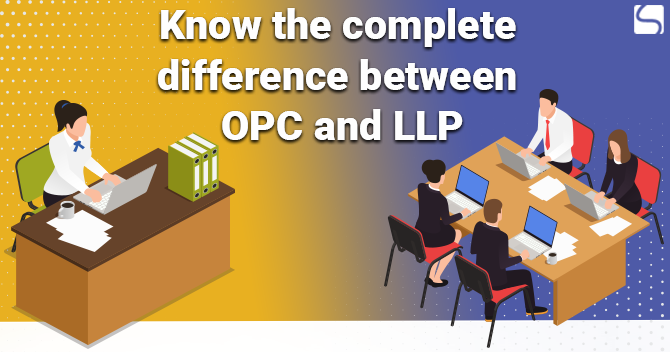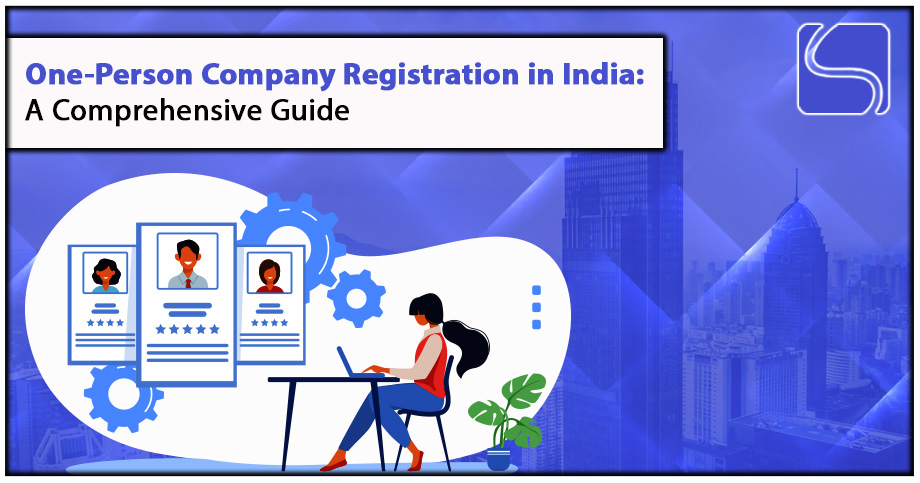Know the complete difference between OPC and LLP

Japsanjam Kaur Wadhera | Updated: Dec 19, 2020 | Category: Limited Liability Partnership, One Person Company
OPC and LLP are two different business structures, OPC stands for One Person Company and LLP stands for Limited Liability Partnership. OPC is governed by the Companies Act, 2013 and LLP is governed by the Limited Liability Partnership Act, 2008. The formation of OPC requires only one person whereas in LLP two persons are required for the formation of LLP. This article will help you to know the complete difference between OPC and LLP. Even though there are similarities between the two, but they still differ from each other in a wide sense. Let us understand this in the below article.
Table of Contents
Introduction to One Person Company
Section 2(62) of the Companies Act, 2013 defines one person company as a company which consists of only one person for its formation. As per section 2(68) and Section 3(1) (c), one person company is a type of private company.
Rule 3 of the Companies Incorporation Rules 2014, states that only one person who is an Indian citizen and resident of India shall be eligible information of a One Person Company. And nominee shall be appointed on behalf of the owner, who shall perform on his behalf in cases of death of the owner or he becomes incapacitated to operate the company. A person can form only 1 one person company at a point of time and nominee of that company shall not be a nominee of more than a 1 one person company.
Introduction to Limited Liability Partnership
A Limited Liability Partnership is incorporated and registered under the Limited Liability Partnership Act, 2008[1]. It has elements of both a partnership firm as well as a corporate structure and therefore, also termed as a hybrid of a partnership and a company.
An LLP has a separate legal entity from that of its partners and members and can continue to exist despite of changes in its partners. Such type of entity is useful for small and medium enterprises and for those in the service sector particularly due to the flexibility in its operation and structure.
LLP is especially suitable for professionals such as lawyers, company secretaries, cost accountants, chartered accountants and etc. as it helps them to form a multidisciplinary limited liability partnership firm. State the difference between OPC and LLP .
|
Points of Difference |
One Person Company |
Limited Liability Partnership |
|
Applicability |
OPC is governed under the provisions of Companies Act, 2013. |
LLP is governed under the provisions of Limited Liability Partnership Act, 2008. |
|
Registering Authority |
The registering authority of one person company is the Registrar of the Company (ROC) |
The registering authority of Limited Liability Partnership is the Registrar of the LLP |
|
Minimum Capital |
Minimum paid-up capital required is Rs. 1 lakh to start a One Person Company. But, after the amendment in 2015, no minimum capital is required for the formation of OPC. |
No specific minimum capital is required under Limited Liability Partnership |
|
Number of Members |
Only one person is required to incorporate an OPC. However, a nominee has to be appointed on behalf of the owner, who in cases where the owner dies or become incapacitated to perform his duty, shall act on his behalf. |
Minimum two members are required for the formation of LLP. However, there no maximum limit to it. |
|
Compliance |
The statutory compliance costs more in OPC. Compliance is to be maintained as per the Companies Act and Income Tax Act. |
The statutory compliance costs are less in LLP. |
|
Penalty on non- compliance |
Up to 1 lakh |
Up to 5 lakh |
|
Conversion |
OPC is allowed to be converted to a Private Limited Company after 2 years of formation. |
No conversion of LLP is allowed. |
|
Taxation Benefit |
· Wealth Tax is charged at 1% and the surcharge is applicable. · A loan to the director is taxable. · No uniformity in the rates of minimum alternative tax. |
· No wealth tax and the surcharge is applicable. · Loan to directors is not taxable. · Uniformity in the rates of minimum alternative tax. |
|
Audit Requirements |
Audit is compulsory, regardless of the amount of share capital in an OPC |
When the capital contribution is above 25 lakh or when the turnover exceeds Rs. 40 lakh, then the auditing is required in an LLP |
|
Inheritance of Entity |
The company has a separate legal entity from that of the owner. However, a nominee is required at the time of formation of an OPC. |
The LLP has a separate legal entity from that of the owner and also has a perpetual succession. |
|
Dissolution |
An OPC is dissolved when the individual company shareholder is not active. Before winding up the company, a NOC is obtained from the creditors. |
For LLP’s winding up, an LLP liquidator is appointed to file the copy of the order to the tribunal with the registrar. |
|
Transferability |
Shares are not transferable, since only one shareholder is there in a One Person Company. However, shares can be transferred after the amendment in Articles of Association (AOA). |
The shares can be transferred by making a written agreement before the notary public in case of Limited Liability Partnership. |
What are the similarities between OPC and LLP?
While we talked about the difference between OPC and LLP, there are certain similarities between the two as well. Both the One Person Company and Limited Liability Partnership have a separate legal entity from that of its owner or partners.
OPC and LLP have perpetual succession, that is, it does not effect the existence of OPC and LLP in cases like bankruptcy, death, transfer, exit and etc. of the owner or the partners.
In OPC and LLP, the capital is raised privately from the partners or the shareholders as it cannot be raised from the general public or borrowers like in other types of entities.
Lastly, the owner or the partners in a One Person Company and Limited Liability Partnership are liable for their actions to the extent of capital contribution made by them in the company.
Conclusion
There are many benefits in the registration of OPC and LLP. It provides many opportunities for entrepreneurs to start up a company with limited liability and minimum capital investment in the entity. Even though they have similarities, however, there is a difference between OPC and LLP in many ways.
It depends upon the entrepreneur to choose what type of entity it would prefer depending upon the nature and operation of its business.
Also, Read: Is it Necessary to Register a Partnership Firm?














